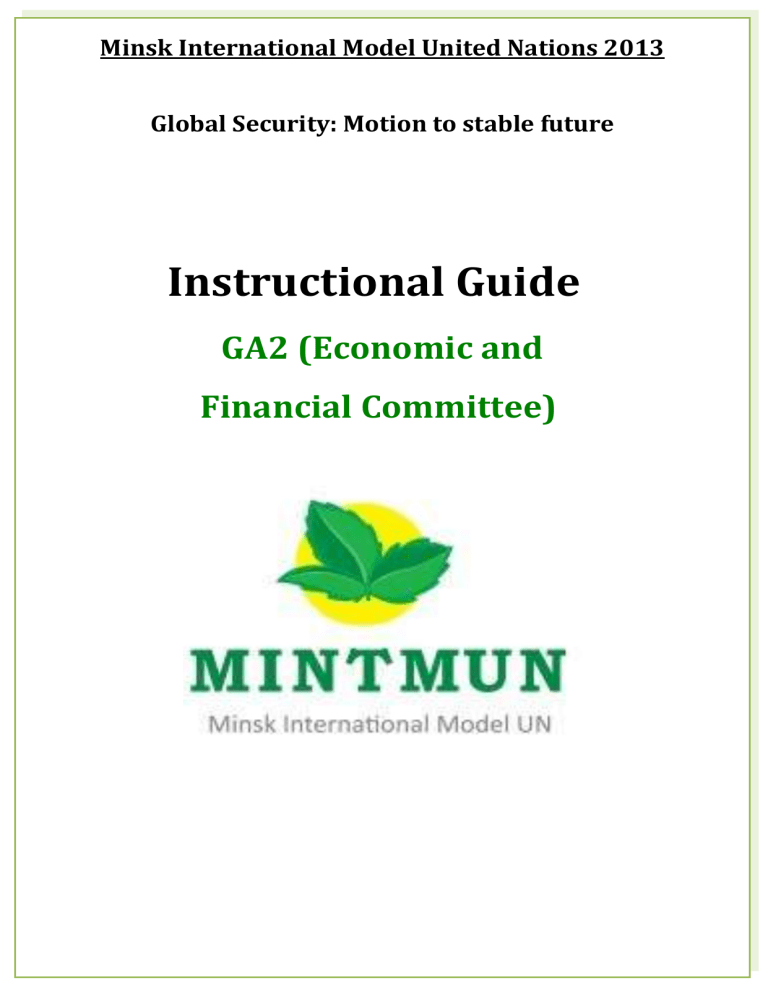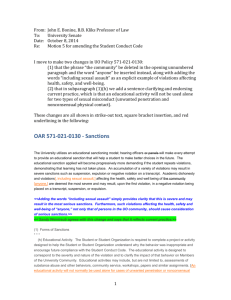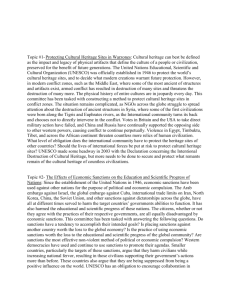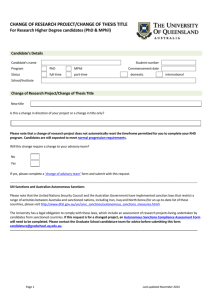Instructional Guide - Minsk International Model United Nations

Minsk International Model United Nations 2013
Global Security: Motion to stable future
Instructional Guide
GA2 (Economic and
Financial Committee)
Minsk International Model United Nations University Conference 2013
GA 2 (Economic and Financial Committee)
Honorable delegates of Economic and Financial Committee! We are very pleased to be serving as your Chairs at the First Minsk International Model
United Nations conference for University Students.
The issues addressed by the GA2 (ECOFIN) range from macroeconomic policy questions such as public debt sustainability and financial regulation to issues concerning globalization and interdependence, human settlements, poverty eradication, and the financing for development. In light of the global financial and economic crisis, the GA2 has recently focused on the coordination of economic policies in order to re-strengthen international financial and economic stability.
Now some facts about us, the Chairs of ECOFIN:
My name is Valeria Yasukevich. I’m a student of the journalism faculty at the Belarusian State University. This is going to be my sixth conference overall and I am thrilled to be serving as Chairman for the third time already. Every
MUN I took part in was an immense experience not just because I met great people but because I always got the feeling that I had a chance to change the world. I am looking forward to meeting you and expecting a great, productive and enjoyable session.
My name is Vita Arhipova. I’m a 1-year student of Belarusian State
Economic University. It will be a great pleasure for me to be a Chair of
Economic and Financial Committee in MINTMUN 2013. This is going to be my
6th MUN experience and I do hope everyone will have a wonderful time during our conference. I think that MUNs are great chances to improve language skills, to get to know people from different cultures and countries and to have an overview on the international political situation. I suggest you to have a sufficient preparation on the topics that will be discussed in order to make our debates more interesting and involving. I hope we'll have really unforgettable time!
This year’s topics are as follows:
1.
Information asymmetry as a major factor amplifying financial crisis.
2.
Economic sanctions as aggressive action. challenging but rewarding one.
Your experience in the General Assembly Second Committee will be a
Best regards,
Valeria Yasukevich and Vita Arhipova.
2
Minsk International Model United Nations University Conference 2013
GA 2 (Economic and Financial Committee)
1.Information asymmetry as a major factor amplifying financial crisis
In the financial sector, due to the structure of the involved companies, the sophisticated network of exposures among institutions, the related credibility problems and the inter-temporal character of financial contracts contagion phenomenon is hence considered a noteworthy topic in the scientific discussions. In the same time, any financial crisis impacts the real economy.
The integration of financial markets plays an important role in the transmission mechanism. Interdependent financial markets are especially exposed to systemic risks that can be spread more easily. In a globalized market, risks are not limited to a certain market, but can spread easily across borders.
The ongoing financial crisis has brought into attention the importance of liquidity that influence the force of existing real and financial sector transmission channels and even create additional transmission channels.
The effects of an international financial crisis are transmitted via commercial channel through a deceleration of exports increase or even through the downturn of their exports. Through the financial channel the access to the external financing is narrowed and thus the volume of lending is restricted and can generate private external debt service difficulties.
Information asymmetries in credit markets constitute the backbone of the financial intermediation theory. In fact information asymmetries have been one of the causes of the current financial crisis, as some investors took on risks they did not sufficiently understand. Innovative derivative instruments and securitization enabled the originators of loans to distribute the risk to investors with little knowledge about the credit quality of the borrowers. The market for syndicated loans is one of the major markets allowing such risk sharing and distribution.
Asymmetric information has two facets in loan syndications. Firstly, there are information asymmetries between the group of lenders and the borrower.
Secondly, there are information asymmetries among the arranger and participant banks of the syndicate about the borrower. The arranger is likely to have more proprietary information about the borrower than the participants, either because it has experience in lending to the particular borrower or the sector, or because it is the borrower’s relationship bank. Information asymmetries among the syndicate members may arise before and after loan signing. At the initial pricing phase the participant banks depend on the arranger to evaluate the riskiness of the borrower. Here there is a first type of moral hazard problem.
Some facts about information asymmetry:
1. Asymmetric information results in two problems: adverse selection, which occurs before the transaction, and moral hazard, which occurs after the transaction. Adverse selection refers to the fact that bad credit risks are the ones most likely to seek loans, and moral hazard refers to the risk of the
3
Minsk International Model United Nations University Conference 2013
GA 2 (Economic and Financial Committee) borrower’s engaging in activities that are undesirable from the lender’s point of view.
2. Adverse selection interferes with the efficient functioning of financial markets. Tools to help reduce the adverse selection problem include private production and sale of information, government regulation to increase information, financial intermediation, and collateral and net worth. The freerider problem occurs when people who do not pay for information take advantage of information that other people have paid for. This problem explains why financial intermediaries, particularly banks, play a more important role in financing the activities of businesses than securities markets do.
3. Moral hazard in equity contracts is known as the principal–agent problem, because managers (the agents) have less incentive to maximize profits than stockholders (the principals). The principal–agent problem explains why debt contracts are so much more prevalent in financial markets than equity contracts. Tools to help reduce the principal–agent problem include monitoring, government regulation to increase information, and financial intermediation.
4. Tools to reduce the moral hazard problem in debt contracts include net worth, monitoring and enforcement of restrictive covenants, and financial intermediaries.
5. Financial crises are major disruptions in financial markets. They are caused by increases in adverse selection and moral hazard problems that prevent financial markets from channeling funds to people with productive investment opportunities, leading to a sharp contraction in economic activity.
The five types of factors that lead to financial crises are increases in interest rates, increases in uncertainty, asset market effects on balance sheets, problems in the banking sector, and government fiscal imbalances.
Sequence of Events in the Mexican, East Asian and Argentine Financial
Crisis
4
Minsk International Model United Nations University Conference 2013
GA 2 (Economic and Financial Committee)
2. Economic sanctions as aggressive action
Economic sanctions are rapidly becoming one of the major tools of international governance of the post-Cold War era. Essentially, economic sanctions imposed by a state, a group of states, or an international organization become a form of power exercised to influence other countries’ behavior or policy, which does not necessarily violate international law.
Economic warfare represents a long-term approach to dealing with adversaries while economic sanctions usually have immediate political goals.
Economic inducements involve commercial concessions, technology transfers, and other economic carrots that are extended by a sender in exchange for political compliance on the part of a target. “Economic inducements” are also called “positive sanctions.”
The UN Security Council, empowered under Article 16 of the UN Charter to use economic measures to address "threats of aggression" and "breaches of peace," approved partial or comprehensive sanctions on only two occasions from
1945 to 1990. By contrast, since 1990 the Security Council has imposed sanctions on eleven nations, including the former Yugoslavia, Libya, Somalia,
Liberia, Haiti, and several other nations.
However, the U.S. has imposed sanctions, unilaterally or with other nations, far more frequently than any other nation in the world, or any multinational body in the world, including the United Nations. More than twothirds of the sixty-plus sanctions cases between 1945 were initiated and maintained by the United States, and three-quarters of these cases involved unilateral U.S. action without significant participation by other countries.
Thus, while the question of ethical legitimacy has implications for the UN strategies of international governance, it has far greater implications for the
U.S., which uses sanctions more frequently and in many more contexts, from trade regimes and human rights enforcement to its efforts to maintain regional and global hegemony.
Sanctions seem to lend themselves well to international governance. They seem more substantial than mere diplomatic protests, yet they are politically less problematic, and less costly, than military incursions. They are often discussed as though they were a mild sort of punishment, not an act of aggression of the kind that has actual human costs. Consequently, sanctions have for the most part avoided the scrutiny that military actions would face, in the domains of both politics and ethics.
There are four main methods of applying economic sanctions by the sender: trade controls, suspension of aid or technical assistance, freezing of the target’s financial assets, and blacklisting of companies involved with bilateral business.
First, trade controls (both goods and services) by the sender include one or more of the following elements: quotas on exports/imports; restrictive exports/imports licensing; limited or total export disruption (embargo); limited or total import disruption (boycott); discriminatory tariff policy (including
5
Minsk International Model United Nations University Conference 2013
GA 2 (Economic and Financial Committee) denial of most favored nation status); restriction or cancellation of fishing rights; suspension or cancellation of trade agreements; and bans on strategic goods and advanced technology exports.
Second, suspension of aid or technical assistance by the sender includes one or more of the following elements: reduction, suspension, or cancellation of credit facilities at concessionary or market rates; reduction, suspension, or cancellation of technical assistance, military assistance, development assistance, and training programs; and votes against loans, grants, subsidies, and funding for technical or other assistance from international organizations.
Third, freezing of the target’s financial assets by the sender includes one or more of the following elements: freezing or confiscation of bank assets of the target government or target nationals; confiscation or expropriation of other target assets, including the target’s investment in the sender; freezing interest or other transfer payments; refusal to refinance or reschedule debt repayments
(interest and principal); and suspension or cancellation of joint projects.
Fourth, blacklisting of companies involved with bilateral business by the sender includes the following elements: blacklisting of sender’s or third parties’ companies doing business with the target, including trade and investment; and/or blacklisting of the target’s companies doing business with the sender, including trade and investment.
The Goals of Economic Sanctions
Punishment (Deterrence)
Both historically and conceptually, economic sanctions have been used to punish a transgression. Like sending a criminal to prison, the goal is not necessarily to rehabilitate the wrong-doer, but to punish him for his offense and to deter others from such wayward behavior. Economic sanctions invoked for punitive ends also serve to define unacceptable behavior, either unilaterally or multilaterally, and thus contributes to the establishment of internationally accepted standards of legitimate conduct.
Compliance (Coercion)
The sender may impose economic sanctions in order to force the target to alter its policy or behavior to conform to the sender’s preference or specific political goals, such as compelling desired action, encouraging acceptance of international norms, or restoring the status quo. In deterrence, one seeks to prevent action. In compliance, the sender is seeking to force the target to undo an action.
6
Minsk International Model United Nations University Conference 2013
GA 2 (Economic and Financial Committee)
Destabilization (Subversion)
The sender may impose economic sanctions to destabilize the target government or subvert the entire target political regime. For example, Stalin sought to replace Tito with a pro-Soviet leader by imposing economic sanctions against Yugoslavia (1948-1955). When the U.S. embargoed Cuba (1960-), it hoped to replace Castro’s regime with a non-communist one. The economic sanctions imposed by the Organization of American States and the United
States against Haiti (1991-1996) demanded the restoration of the democratically elected President Jean-Bertrand Aristide, who had been overthrown in a military coup led by Lieutenant General Raoul Cedras.
Signaling
The imposition of economic sanctions conveys a signal of the sender’s resolve to both the target and the sender’s allies. It says that the words of the sender will be supported with action. Economic sanctions by a great power or an international organization often imply a threat of more drastic action (for example, military) against the target country.
The examples of the UN’s resolutions:
S/RES/794 (1992) Somalia http://www.securitycouncilreport.org/atf/cf/%7B65BFCF9B-6D27-4E9C-
8CD3-CF6E4FF96FF9%7D/Chap%20VII%20SRES%20794.pdf
S/RES/1132 (1997) Sierra Leoene http://www.sipri.org/databases/embargoes/un_arms_embargoes/sierra_le one/1132
S/RES/1267 (1999) Afghanistan http://www.bmf.gv.at/Finanzmarkt/GeldwschereiundTerr_2675/DieVerein tenNationen/Security_Council_Resolution_1267-1999.pdf
S/RES/1489 (2003) Democratic Republic of the Congo http://www.unhchr.ch/Huridocda/Huridoca.nsf/(Symbol)/S.RES.1489+(2
003).En?Opendocument
S/RES/1574 (2004) Sudan http://www.mpil.de/shared/data/pdf/resolution_1574.pdf
7
Minsk International Model United Nations University Conference 2013
GA 2 (Economic and Financial Committee)
Useful links:
If you have any questions or are in need of more in-depth information, more sources are available at the links below:
1. Information asymmetry as a major factor amplifying financial crisis
Organizations:
Past ECOFIN committee sessions http ://www.un.org/en/ga/second/archives.shtml
UN DESA (Department of Economic and Social Affairs) http://www.un.org/en/development/desa/index.html
The Organization for Economic Co-operation and Development (OECD) http://www.oecd.org/about/
International Institute for Sustainable Development http://www.iisd.org/
Useful info:
The Role Of Credit Ratings In The Financial System http://www.standardandpoors.com/ratings/articles/en/us/?articleType
=HTML&assetID=1245333793833
Market Failures of the Financial Crisis http://www.adbi.org/workingpaper/2011/02/08/4377.market.regulatory.failures.lessons.gfc/market.
failures.of.the.financial.crisis/
Adverse Selection and Financial Crises http://www.bankofcanada.ca/wpcontent/uploads/2011/02/kirabaeva.pdf
The Financial accelerator effect: concept and challenges http://www.ijf.hr/eng/FTP/2011/2/coric.pdf
Asymmetric information: the multiplier effect of financial instability http://mpra.ub.uni-muenchen.de/23013/1/asym_information.pdf
2. Economic sanctions as aggressive action
http://www.un.org/sc/committees/
http://www.gao.gov/assets/220/217680.pdf
http://en.wikipedia.org/wiki/Economic_sanctions
http://www.tid.gov.hk/english/import_export/uns/uns_countrylist.html
8






